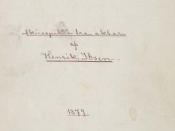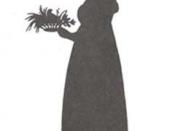All successful drama consists of conflict, whether between or within characters. Henrik Ibsen's work, A Doll's House is no exception. Ibsen's play studies Nora's early courage and her confirmation of that courage at the end of the play. Nora's strength of character in forging her father's signature on a loan, and the repercussions of that act, provide much of the driving force for the drama. But Nora's great choice remains until the last act. She speaks of "the most wonderful thing," she has countless opportunities to escape from her dilemma through the assistance of Krogstad or Rank, but it is not until the final pages of Act IV that her final decision, and that resounding door slam, emphasize Nora's final courageous choice to leave her husband and unhealthy marriage.
If A Doll's House takes an early act of courage as its driving force, its successor, Ghosts, uses one of cowardice.
Mrs. Alving's early failure to reveal her husband's true character and actions to his children provides the "tragic flaw" for the only play Ibsen described as a "Tragedy." Much of the action in this play -- Osvald's depression and disastrous love for Regine -- stems from that early decision. Mrs. Alving spends much of the first two acts ago nizing over her early cowardice -- "if we only had the courage to sweep [the ghosts] all out and let in the light!" Mrs. Alving at last brings herself to tell Osvald the truth about his father, but by then it is too late. Her son is dying, and, bereft of any other company, relies on her to help him end his misery. And the curtain slowly closes on Mrs. Alving, still in agony in the cowardice of indecision, as irresolute and uncertain at the end as she was in...


